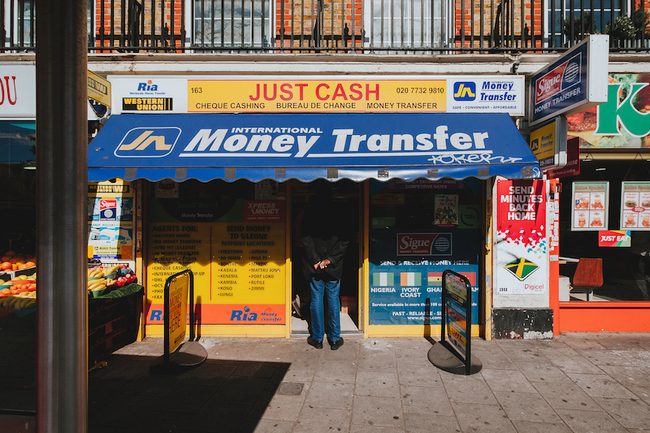- Opinion
- Banking & Finance
Let’s make it faster and cheaper to send money home
Millions of families depend on the funds sent by loved ones overseas. Policymakers and industry must simplify the process now
 Unsplash
Unsplash
More than 200 million people send money to friends and family in other countries every year. Globally, an estimated 800 million people depend on these cross-border person-to-person payments – known as remittances – to pay for food, utilities and education.
Global remittance inflows hit a record $773 billion in 2021, according to the World Bank. Of this sum, $605 billion went to low and middle-income countries, chief among them India, Mexico, China, the Philippines and Egypt.
Thirty countries received more than 10 percent of their GDP via these payments in 2021. Eight received more than a quarter of their GDP this way – for Lebanon, it was 54 percent.
Expatriates based in Saudi Arabia sent about $40 billion in 2021, while for the UAE outward personal remittances totalled $47.5 billion. The top two destinations were India and Pakistan.
30 countries got more than 10% of their GDP via these payments in 2021. For Lebanon, it was 54%
Technology has simplified how people move money internationally, removing the need for a recipient to go to a shop and be handed cash. Yet in many ways, the remittance process has remained unchanged for 150 years. Some international transfers still take days to complete, with the costs borne by the sender and receiver.
I’ve worked with Visa in the UAE for more than a decade and, in that period, consumer expectations of a seamless and secure method for moving funds have risen in tandem with the rapid advancements in the payments ecosystem.
Costs, while still high, are starting to inch down. According to the World Bank, the global average cost of sending $200 is six percent. However, this is still double the UN Sustainable Development Goal target.
Digital solutions are emerging. The global proliferation of connected devices, fintech and bank innovation, and solutions developed by payment networks such as Visa are helping to bring seamless, secure and rapid digital remittances within reach.
There is strong support for this among consumers. A Visa survey found that 59 percent of remitters have sent or plan to send money using digital-only platforms.
Yet the challenges remain formidable. There is little to no interoperability at the technical and regulatory levels – including anti-money-laundering laws. Most international transfers are managed through daisy-chain bilateral banking relationships, adding expense and complexity.
Policymakers seeking to streamline digital remittances should adopt a principle-led and outcome-based approach, giving payment service providers and networks the flexibility to innovate. We offer four recommendations that will lift everyone:
1 Engage in public-private dialogue and partnerships
There is widespread recognition that governments, NGOs and the private sector need to collaborate to close the digital equity gap and ensure secure, reliable and fast remittances for everyone, everywhere.
2 Streamline regulation
Simplifying and aligning rules can reduce the barriers to cross-border payments. The private sector should prioritise creating products that offer better customer experiences and enable more efficient transfers of money. The public sector can play its role by streamlining licensing so the benefits of digital remittances can reach more people.
3 Prioritise open interoperability
We need to work towards a global, open and interoperable payments system that is fast and reliable. It needs to be built on a foundation of security and resilience, accommodating the needs of different kinds of stakeholders. Getting interoperability right is essential for achieving a more equitable, inclusive payment system.
4 Understand that scale and security are a must for success
A truly interoperable service should be able to reach as many endpoints as possible: traditional bank accounts, prepaid accounts or digital wallets. Consider, for example, that today through the Visa system alone, a financial institution can reach a combined total of more than 5 billion cards and bank accounts. Meanwhile, adopting digital security systems enables real-time vetting of fraudulent transfers, with tokens and artificial intelligence increasing the security of remittances. Alleviating fraud risk requires significant investment in areas such as authentication methods, behavioural biometrics and aggregation tracking. Similarly, transaction and algorithmic tools to flag suspicious activity and check global databases are essential components of any real-time payment solution.
Families all over the world are depending on remittances. It’s up to policymakers and the private sector to improve payment flexibility, ease and reach, in order to help alleviate poverty and support local economies. Together, we can accelerate financial and digital inclusion.
Shahebaz Khan is senior vice president, head of new payment flows, for Central and Eastern Europe, the Middle East and Africa at Visa
Register now: It’s easy and free
AGBI registered members can access even more of our unique analysis and perspective on business and economics in the Middle East.
Why sign uP
- Exclusive weekly email from our editor-in-chief
- Personalised weekly emails for your preferred industry sectors
- Read and download our insight packed white papers
- Access to our mobile app
- Prioritised access to live events
Already registered? Sign in














